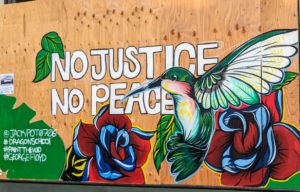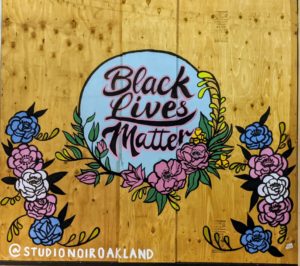The international development sector has long hidden an ugly secret. Beneath its benevolent exterior, lies a long and complicated history that is intimately tied to the West’s imperial past. The recent global Black Lives Matter protests, sparked by George Floyd’s murder in the USA, have put racial justice squarely on the agenda; a subject matter which is currently unearthing many uncomfortable truths for every facet of Whiteness and the international development sector is not exempt.
In the Western imagination, aid to developing countries has always been framed as a moral responsibility; something done out of the goodness of its heart to address the plight of the poor natives who have been failed by their lazy and corrupt leaders – use Binyavanga Wainaina’s How to Write About Africa to help fill in the gaps. This narrative has always conveniently ignored the West’s central role in orchestrating the very problems it is so committed to resolving. While dispensing crumbs with one hand, it has continued to loot from the Global South with the other. It starts with centuries of dehumanising, enslaving and killing Black people for profit during the trans-Atlantic slave trade all the way to systematic pillaging under colonialism, all upon which the West’s wealth is founded.
In modern times, this has manifested in the creation of the international financial rules that deliberately keep countries in the Global South poor and dependent while the West continues to hoard all the decision-making powers within the institutions which make these very rules. Thus, it is impossible to frame Western aid as generosity. However, this is how we have been taught to understand it; free from the benefactor’s physical and institutional violence instead of the neocolonial project that it is. All too often, the West’s attempts at help in the Global South have had the effect of simply placing a plaster on the festering bullet wound which it has inflicted. To paraphrase Malcolm X, progress would be attempting to heal the gunshot wound. However, as it stands, the bullet remains deeply lodged, with some continuing to deny that the wound even exists.
The issue of race is intimately tied to international development although you would struggle to find any of this kind of analysis in the sector’s work. But this is hardly surprising when the decision-makers are overwhelmingly White and occupy all the space at the inaccessible table they have built. While there are of course Black people and People of Colour (BPOC) who have been granted a seat at this table, they cannot single-handedly create more space or, better yet, dismantle the table altogether. This is no different from how the rest of the world functions and, in the international development sector, this has led to the reproduction of colonial forms of knowledge and the institutionalisation of White supremacy culture in a supposed justice-oriented industry. This has had the effect of silencing BPOC working in the sector – particularly those who dare to question the concept of aid and demand a complete overhaul of a sector which has become an elite career for a small few instead of a vehicle for helping to deliver justice for all.

The Black Lives Matter protests have thrown these issues into sharp focus. However, such brutally honest discussions are almost impossible in a sector filled with White people who believe they are immune from accusations of racism by simple virtue of the work they do. However, White supremacy has no boundaries. The amateurish way in which racism is understood has reduced it to being about the individual infractions by White people against BPOC. Of course, continued micro-aggressions centred around the difficulties of pronouncing our names and how difficult it must be to brush through afro hair will inevitably produce a toxic work environment. But reducing racism to these kinds of interactions alone ignores the ways in which it is systemic – how it affects who gets a seat and can speak at that inaccessible table, who frames the organisation’s priorities and makes decisions about hiring as well as how money is spent. All these issues are inherently racialised in this sector but all too often, rocking the aid industrial complex boat comes with severe consequences – especially for Black women and women of colour who encounter both racism and sexism while being silenced and policed.
The Black Lives Matter protests are likely to see a flurry of Diversity and Inclusion training sessions being rolled out across many organisations coupled with offers of reform which will not fundamentally threaten or change the status quo. In the words of the legendary Angela Davis, diversity is not synonymous with justice but is instead a corporate strategy “designed to ensure that the institution functions in the same way that it functioned before, except that you now have some black faces and brown faces. It’s a difference that doesn’t make a difference”. This is especially true when diversity drives result in more BPOC across the organisation who are almost exclusively in non-threatening entry-level jobs where they have no decision-making powers. And where BPOC are employed in decision-making roles, there is often a real danger that they might be used as ‘window dressing’ for the organisation while helping to reproduce and legitimise Whiteness.
This piece will not include any anti-racism reading lists or another litany of recommendations about how to address systemic racism within the international development sector. Years of recommendations about how to reform it have remained unheard with many suffering from burn out and disillusionment before ultimately leaving the sector. But critically, it is neither my job nor my responsibility to freely educate White people about the untold harm that Whiteness has done to this sector – from the framing of its work and its priorities, to its effects on BPOC staff and partners in the Global South. As a bare minimum, organisations must start by creating safe, non-recriminatory, spaces for their BPCOC staff and partners to be able to honestly air their concerns and put in place tangible remedies – squarely around the prioritise raised by BPOC – to rectify deeply embedded structural issues.

There is a real risk that the current Black Lives Matters protest will morph into cosmetic and performative changes within the international development sector. This includes empty solidarity statements, commitments to “listening and learning” and platitudes about “shifting power” and, all the while, White people continue to control all the means of production. As the global protests grow, with statues continuing to fall and the question of reparations on the lips of those who have profited from Black lives, the international development sector cannot continue to exist in its current form. Evolve or perish.
Below some of the very many papers and recommendations that have been produced about reforming the international aid sector:
Home Truths: Undoing racism and delivering real diversity in the charity sector, by Acevo, 2020.
Time to dismantle racism in international development by Lena Bheeroo, Leila Billing, Eliza-Helen Ampomah, Pontso Mafethe and Alan Lally-Francis, 2020.
Can reparations help us to re-envision international development? By Priya Lukka, 2020.
Are INGOs ready to give up power? by Dian Doane, 2020.
Healing Solidarity: re-imaging international development by Mary Ann Clements, 2018. Open Democracy.
Enough of aid – let’s talk reparations by Jason Hickel, 2015.
Healing Solidarity – resources to support you to be part of re-imagining ‘international development’
Sophie Efange is a Black Feminist of Ethiopian and Cameroonian heritage. She works as the Policy Manager at the Gender and Development Network in London and is a Trustee at Womankind Worldwide. Sophie’s professional area of expertise centres on women’s economic justice. She is an ardent gender and racial justice advocate.

I am happy to read your essay, Sophie. I only wish reflections like these had been heard more loudly and earlier. Although I am profoundly skeptical, a small ember of hope remains that this moment’s opening can produce something different. As a white woman from the Global North, I have been an ambivalent participant in the aid sector, never quite finding a ‘right fit’ largely due to the issues you raise. Being less conscious might have made me more successful, but something always felt ideologically wrong. I hope that more frank conversations that illuminate the systemic power imbalances can reveal new ways of working across these lines. Looking forward to more robust conversations in this field on these urgent topics.